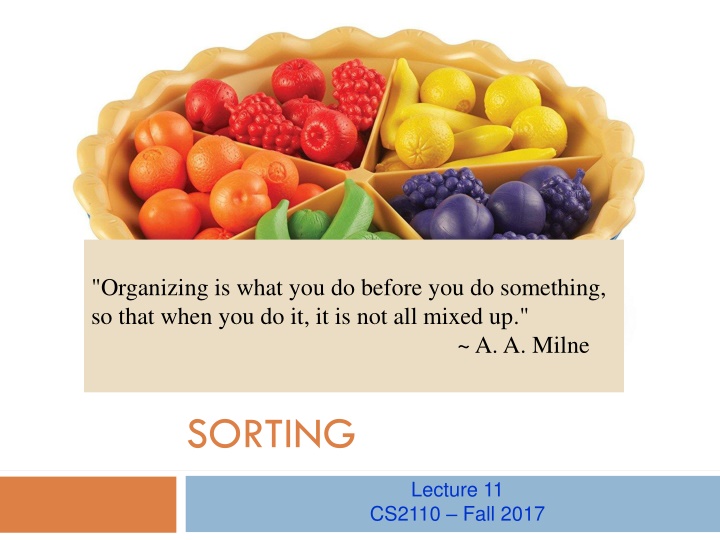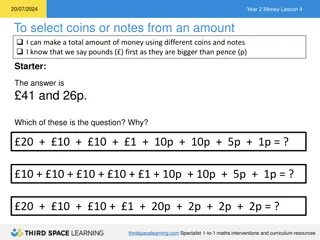
CS2110 Fall 2017 Sorting Lecture Summary
Dive into the world of sorting algorithms with CS2110's Fall 2017 lecture series. Explore the importance of organizing before action and learn about various methodologies such as Insertion Sort, Selection Sort, Merge Sort, and Quick Sort. Discover the significance of database indexing, operations research, and compression in sorting processes.
Download Presentation

Please find below an Image/Link to download the presentation.
The content on the website is provided AS IS for your information and personal use only. It may not be sold, licensed, or shared on other websites without obtaining consent from the author. If you encounter any issues during the download, it is possible that the publisher has removed the file from their server.
You are allowed to download the files provided on this website for personal or commercial use, subject to the condition that they are used lawfully. All files are the property of their respective owners.
The content on the website is provided AS IS for your information and personal use only. It may not be sold, licensed, or shared on other websites without obtaining consent from the author.
E N D
Presentation Transcript
"Organizing is what you do before you do something, so that when you do it, it is not all mixed up." ~ A. A. Milne SORTING Lecture 11 CS2110 Fall 2017
Prelim 1 2 It's on Tuesday Evening (3/13) Two Sessions: 5:30-7:00PM: netid aa..ks 7:30-9:00PM: netid kt..zz If you have a conflict with your assigned time but can make the other time, fill out conflict assignment on CMS BY TOMORROW Three Rooms: We will email you Tuesday morning with your room Bring your Cornell ID!!!
Prelim 1 3 Recitation 5: prelim review Review Session: Sunday 3/11, 1-3pm in Kimball B11 Study guide on course website
Why Sorting? 4 Sorting is useful Database indexing Operations research Compression There are lots of ways to sort There isn't one right answer You need to be able to figure out the options and decide which one is right for your application. Today, we'll learn about several different algorithms (and how to derive them)
Some Sorting Algorithms 5 Insertion sort Selection sort Merge sort Quick sort
InsertionSort 6 0 b.length ? 0 b.length sorted pre:b post:b A loop that processes elements of an array in increasing order has this invariant 0 i b.length sorted ? b inv: or: b[0..i-1] is sorted
Each iteration, i= i+1; How to keep inv true? 7 0 i b.length sorted ? b inv: 0 i b.length 2 5 5 5 7 3 ? e.g. b 0 2 3 5 5 5 7 i b.length ? b
What to do in each iteration? 8 8 0 i b.length sorted ? b inv: 0 i b.length 2 5 5 5 7 3 ? e.g. b 2 5 5 5 37 ? Push b[i] to its sorted position in b[0..i], then increase i Loop body 2 5 5 35 7 ? (inv true before and after) 2 5 35 5 7 ? 2 35 5 5 7 ? 0 i b.length 2 3 5 5 5 7 ? This will take time proportional to the number of swaps needed b
Insertion Sort 9 // sort b[], an array of int // inv: b[0..i-1] is sorted for (int i= 0; i < b.length; i= i+1) { // Push b[i] down to its sorted // position in b[0..i] Note English statement in body. Abstraction. Says what to do, not how. This is the best way to present it. We expect you to present it this way when asked. Present algorithm like this Later, can show how to implement that with an } inner loop
Insertion Sort 10 invariant P: b[0..i] is sorted except that b[k] may be < b[k-1] k // sort b[], an array of int // inv: b[0..i-1] is sorted for (int i= 0; i < b.length; i= i+1) { // Push b[i] down to its sorted // position in b[0..i] while (k > 0 && b[k] < b[k-1]) { Swap b[k] and b[k-1] i 2 5 35 5 7 ? example int k= i; start? stop? k= k 1; progress? } } maintain invariant?
Insertion Sort 11 // sort b[], an array of int // inv: b[0..i-1] is sorted for (int i= 0; i < b.length; i= i+1) { // Push b[i] down to its sorted // position in b[0..i]} Let n = b.length Worst-case: O(n2) (reverse-sorted input) Best-case: O(n) (sorted input) Pushing b[i] down can take i swaps. Worst case takes 1 + 2 + 3 + n-1 = (n-1)*n/2 Swaps. Expected case: O(n2)
Performance 12 Algorithm Algorithm Time Time Space Space Stable? Stable? ?(?) to ?(?2) ?(?) to ?(?2) ?(?2) Insertion Sort Insertion Sort Yes Yes ?(1) ?(1) Merge Sort Selection Sort No ?(1) Quick Sort Merge Sort Quick Sort
SelectionSort 13 0 b.length ? 0 b.length sorted pre: b post:b 0 i b.length sorted , <= b[i..] >= b[0..i-1] inv:b Additional term in invariant Keep invariant true while making progress? 0 i b.length 1 2 3 4 5 6 9 9 9 7 8 6 9 e.g.: b Increasing i by 1 keeps inv true only if b[i] is min of b[i..]
SelectionSort Another common way for people to sort cards //sort b[], an array of int // inv: b[0..i-1] sorted AND // b[0..i-1] <= b[i..] for (int i= 0; i < b.length; i= i+1) { int m= index of minimum of b[i..]; Swap b[i] and b[m]; } 14 Runtime with n = b.length Worst-case O(n2) Best-case O(n2) Expected-case O(n2) 0 i length b sorted, smaller values larger values Each iteration, swap min value of this section into b[i]
Performance 15 Algorithm Time Space Stable? ?(?) to ?(?2) ?(?2) Insertion Sort Yes ?(1) Selection Sort No ?(1) Merge Sort Quick Sort
Merge two adjacent sorted segments 16 /* Sort b[h..k]. Precondition: b[h..t] and b[t+1..k] are sorted. */ public static merge(int[] b, int h, int t, int k) { } h t k h t k b 4 7 7 8 9 3 4 7 8 sorted sorted h k b merged, sorted 3 4 4 7 7 7 8 8 9
Merge two adjacent sorted segments 17 /* Sort b[h..k]. Precondition: b[h..t] and b[t+1..k] are sorted. */ public static merge(int[] b, int h, int t, int k) { Copy b[h..t] into a new array c; Merge c and b[t+1..k] into b[h..k]; } h t k sorted sorted h k merged, sorted
Merge two adjacent sorted segments 18 // Merge sorted c and b[t+1..k] into b[h..k] 0 t-h pre: h t k c b x, y are sorted x ? y h k post: b x and y, sorted 0 i c.length invariant: c head of x tail of x h u v k b tail of y ? head of x and head of y, sorted
Merge 19int i = 0; int u = h; int v = t+1; while( i <= t-h){ if(v < k && b[v] < c[i]) { b[u] = b[v]; u++; v++; }else { b[u] = c[i]; u++; i++; } } } h t k 0 t-h pre: c b ? sorted sorted h k post: b sorted inv: 0 i c.length c sorted sorted h u v k b sorted sorted ?
Mergesort 20 /** Sort b[h..k] */ public static void mergesort(int[] b, int h, int k]) { if (size b[h..k] < 2) return; int t= (h+k)/2; mergesort(b, h, t); mergesort(b, t+1, k); merge(b, h, t, k); } h t k sorted sorted h k merged, sorted
Performance 21 Algorithm Algorithm Time Time Space Space Stable? Stable? ?(?) to ?(?2) ?(?) to ?(?2) ?(?2) Insertion Sort Insertion Sort Yes Yes ?(1) ?(1) Merge Sort Selection Sort Yes No ? log(?) ?(?) ?(1) Quick Sort Merge Sort Yes ? log(?) ?(?) Quick Sort
QuickSort 22 Quicksort developed by Sir Tony Hoare (he was knighted by the Queen of England for his contributions to education and CS). 83 years old. Developed Quicksort in 1958. But he could not explain it to his colleague, so he gave up on it. Later, he saw a draft of the new language Algol 58 (which became Algol 60). It had recursive procedures. First time in a procedural programming language. Ah!, he said. I know how to write it better now. 15 minutes later, his colleague also understood it.
Partition algorithm of quicksort 23 h h+1 k x is called the pivot x ? pre: Swap array values around until b[h..k] looks like this: h j k post: <= x x >= x
Partition algorithm of quicksort 20 31 24 19 45 56 4 20 5 72 14 99 24 partition j pivot 19 4 5 14 20 31 24 45 56 20 72 99 Not yet sorted Not yet sorted these can be in any order these can be in any order The 20 could be in the other partition
Partition algorithm 25 h h+1 k b x ? pre: h j k post: <= x x >= x b invariant needs at least 4 sections Combine pre and post to get an invariant h j t k <= x x ? >= x b
Partition algorithm 26 h j t k Initially, with j = h and t = k, this diagram looks like the start diagram <= x x ? >= x b j= h; t= k; while (j < t) { if (b[j+1] <= b[j]) { Swap b[j+1] and b[j]; j= j+1; } else { Swap b[j+1] and b[t]; t= t-1; } } Terminate when j = t, so the ? segment is empty, so diagram looks like result diagram Takes linear time: O(k+1-h)
QuickSort procedure /** Sort b[h..k]. */ publicstaticvoid QS(int[] b, int h, int k) { if (b[h..k] has < 2 elements) return; int j= partition(b, h, k); // We know b[h..j 1] <= b[j] <= b[j+1..k] 27 Base case Function does the partition algorithm and returns position j of pivot // Sort b[h..j-1] and b[j+1..k] QS(b, h, j-1); QS(b, j+1, k); } h j k <= x x >= x
Worst case quicksort: pivot always smallest value j n 28 x0 >= x0 j partioning at depth 0 partioning at depth 1 x0 x1 >= x1 j partioning at depth 2 Depth of recursion: O(n) x0 x1 x2 >= x2 /** Sort b[h..k]. */ publicstaticvoid QS(int[] b, int h, int k) { if (b[h..k] has < 2 elements) return; int j= partition(b, h, k); QS(b, h, j-1); QS(b, j+1, k); Processing at depth i: O(n-i) O(n*n)
Best case quicksort: pivot always middle value 29 0 j n depth 0. 1 segment of size ~n to partition. <= x0 x0 >= x0 Depth 2. 2 segments of size ~n/2 to partition. Depth 3. 4 segments of size ~n/4 to partition. <=x1 x1 >= x1 x0 <=x2 x2 >=x2 Max depth: O(log n). Time to partition on each level: O(n) Total time: O(n log n). Average time for Quicksort: n log n. Difficult calculation
QuickSort complexity to sort array of length n Time complexity Worst-case: O(n*n) Average-case: O(n log n) 30 /** Sort b[h..k]. */ publicstaticvoid QS(int[] b, int h, int k) { if (b[h..k] has < 2 elements) return; int j= partition(b, h, k); // We know b[h..j 1] <= b[j] <= b[j+1..k] // Sort b[h..j-1] and b[j+1..k] QS(b, h, j-1); QS(b, j+1, k); } --depth of recursion can be n Can rewrite it to have space O(log n) Show this at end of lecture if we have time Worst-case space: ? What s depth of recursion? Worst-case space: O(n)!
QuickSort versus MergeSort 31 31 /** Sort b[h..k] */ publicstaticvoid QS (int[] b, int h, int k) { if (k h < 1) return; int j= partition(b, h, k); QS(b, h, j-1); QS(b, j+1, k); } /** Sort b[h..k] */ publicstaticvoid MS (int[] b, int h, int k) { if (k h < 1) return; MS(b, h, (h+k)/2); MS(b, (h+k)/2 + 1, k); merge(b, h, (h+k)/2, k); } One processes the array then recurses. One recurses then processes the array.
Partition. Key issue. How to choose pivot 32 h h k Choosing pivot Ideal pivot: the median, since it splits array in half But computing is O(n), quite complicated b x ? pre: h j k post: b <= x x >= x Popular heuristics: Use first array value (not so good) middle array value (not so good) Choose a random element (not so good) median of first, middle, last, values (often used)!
Performance 33 Algorithm Time Space Stable? ?(?) to ?(?2) ?(?2) Insertion Sort Yes ?(1) Selection Sort No ?(1) Merge Sort Yes ? log(?) ?(?) ?log(?) to ?(?2) Quick Sort No ?(log ? )
Sorting in Java 34 Java.util.Arrays has a method Sort() implemented as a collection of overloaded methods for primitives, Sort is implemented with a version of quicksort for Objects that implement Comparable, Sort is implemented with mergesort Tradeoff between speed/space and stability/performance guarantees
Quicksort with logarithmic space 35 Problem is that if the pivot value is always the smallest (or always the largest), the depth of recursion is the size of the array to sort. Eliminate this problem by doing some of it iteratively and some recursively. We may show you this later. Not today!
QuickSort with logarithmic space 36 /** Sort b[h..k]. */ publicstaticvoid QS(int[] b, int h, int k) { int h1= h; int k1= k; // invariant b[h..k] is sorted if b[h1..k1] is sorted while (b[h1..k1] has more than 1 element) { Reduce the size of b[h1..k1], keeping inv true } }
QuickSort with logarithmic space 37 /** Sort b[h..k]. */ publicstaticvoid QS(int[] b, int h, int k) { int h1= h; int k1= k; // invariant b[h..k] is sorted if b[h1..k1] is sorted while (b[h1..k1] has more than 1 element) { int j= partition(b, h1, k1); // b[h1..j-1] <= b[j] <= b[j+1..k1] if (b[h1..j-1] smaller than b[j+1..k1]) { QS(b, h, j-1); h1= j+1; } else {QS(b, j+1, k1); k1= j-1; } } } Only the smaller segment is sorted recursively. If b[h1..k1] has size n, the smaller segment has size < n/2. Therefore, depth of recursion is at most log n






















